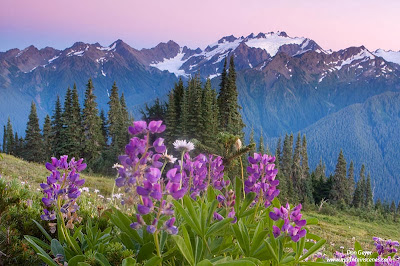 |
| Snoqualmie Falls and an ice filled basin in winter. |
One of my favorite winter destinations in western Washington when the temps dip into the teens is Snoqualmie Falls. The splash from the falls coats the cliffs and rocks in the area and instantly freezes, creating a winter wonderland for the eyes!
Typically, the most common time for this to happen is the month of December. But it can take place in January and February as well. Whenever the cold snap happens, I jump in my vehicle and make the half hour drive from my house to the falls, commonly in the dark so as to be there before sunrise.
 |
| Snoqualmie Falls in winter. |
The facility at Snoqualmie Falls has had a recent face lift. Previous visitors might remember the gazebo-like platform for viewing the falls from the cliff edge. This is gone. A new platform without a roof has taken its place.
Also installed are some new spot lights that are pointed at the upper falls. I think this is a pretty cool feature, both for casual tourists and photographers. See the color highlights at the top of the falls in the image to the left? Evening light as the sun is about to set? Nope. The illumination is actually coming from the new lights. Pretty soft and natural looking, isn't it?
There have been other changes made as well. I really like the upgrade.
There are a couple of different places to enjoy the falls. The most obvious is the platform high up on the cliff edge near the Salish Lodge. This vantage offers a bird's eye view of the falls and is the most famous.
However, curious and adventurous photographers will want to investigate the base of the falls. There is a trail which from the platform area that leads down to the base of the falls. This was closed due to ice during my visit. My advise? Do what most people do and drive down the road a little further to find parking at the lower TH.
 |
| Rime ice beside Snoqualmie Falls. |
For photographers, there is a lot to do here! The obvious subject is the falls, of course. And one can play with both horizontal and vertical compositions. You can include a lot of the area with a wide angle lens, or come in tight with a medium lens.
Ah, but there are even more opportunities with 200mm lens or greater. You can isolate some of the ice formations, working with patterns and natural features.
While photographing the falls, don't forget to play with shutter speeds for a completely different look. You can shoot fast to freeze (almost, in this case) the water, or shoot slower to get the smooth, ribbon effect. Each tell a much different story. What is your preference? Many photographers follow the rule that powerful, turbulent waterfalls are best frozen, while smaller, lighter streams should be shot slower for more artistic effect. What do I think? I think every rule is meant to be broken, and that it is up to artistic perception and interpretation.
Here is a top-bottom comparison of what I am talking about - same composition, different shutter speeds. Which do you like?
 |
| f 2.8, 1/80th second. |
 |
| f 22, 0.8 second. |
Most people equate the choice to, artistic or dramatic? I'll let you be the judge.
For more images of Snoqualmie Falls, check out
an older post I did. You may also view more images in my
Snoqualmie Falls Gallery.
As always, thanks for looking!









